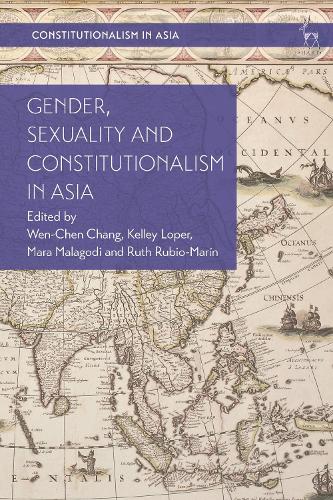
Gender, Sexuality and Constitutionalism in Asia
(Hardback)
Available Formats
Publishing Details
Gender, Sexuality and Constitutionalism in Asia
By (Author) Wen-Chen Chang
Edited by Kelley Loper
Edited by Mara Malagodi
Edited by Ruth Rubio-Marn
Bloomsbury Publishing PLC
Hart Publishing
25th January 2024
United Kingdom
Classifications
Tertiary Education
Non Fiction
Comparative law
Law and society, gender issues
Human rights, civil rights
346.013081095
Physical Properties
Hardback
384
Width 162mm, Height 238mm, Spine 26mm
736g
Description
This book analyses the equal citizenship claims of women and sexual and gender diverse people across several Asian jurisdictions. The volume examines the rich diversity of constitutional responses to sex, gender, and sexuality in the region from a comparative perspective. Leading comparative constitutional law scholars identify opportunity structures to explain the uneven advancement of gender equality through constitutional litigation and consider a combination of variables which shape the diverging trajectories of the jurisdictions in this study. These variables include: - constitutional structures - the composition and powers of the courts - regional constitutional isomorphism - the incorporation of international and regional human rights standards - hermeneutic traditions - colonial legacies - foreign influences - social structures and hierarchies - forms of gendered and/or religious nationalism. The authors also embed the relevant constitutional and legal developments in their historical, political and social contexts. This deep contextual understanding of the relationship between sex, gender, sexuality, and constitutionalism greatly enriches the analysis. The case studies reflect a variety of constitutional structures, institutional designs, and contextual dynamics which may advance or impede developments with respect to sex, gender, and sexuality. As a whole, the chapters further an understanding of the constitutional domain as a fruitful site for advancing gender equality and the rights of sexual and gender diverse people. The jurisdictions covered represent all Asian sub-regions including: East Asia (Japan, Taiwan, Hong Kong, and South Korea), South East Asia (Malaysia, Singapore, Philippines, and Indonesia), and South Asia (India, Nepal, Pakistan, and Sri Lanka). The introductory framework chapter situates these insights from the region within the broader global context of the evolution of gender constitutionalism.
Author Bio
Wen-Chen Chang is jointly appointed as Dean and Professor at the National Yang Ming Chiao Tung University School of Law, and Professor at the National Taiwan University College of Law, Taiwan. Kelley Loper is Associate Professor and Director of the LLM in Human Rights Programme in the Faculty of Law at the University of Hong Kong, Hong Kong. Mara Malagodi is Reader in Law at the School of Law, University of Warwick, UK. Ruth Rubio-Marn is Professor of Constitutional Law at the University of Sevilla, Spain, and Adjunct Professor at the School of Transnational Governance, European University Institute, Italy.
